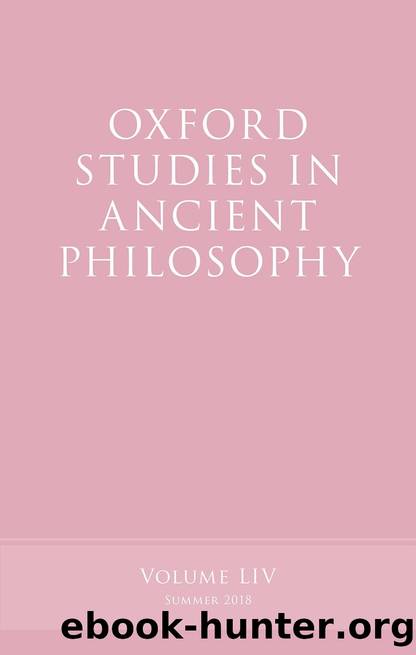Oxford Studies in Ancient Philosophy, Volume 54 by Victor Caston;

Author:Victor Caston; [Caston, Victor]
Language: eng
Format: epub
ISBN: 9780192558756
Publisher: OUP Premium
Published: 2018-04-23T00:00:00+00:00
Causality and Coextensiveness in AristotleâS Posterior Analytics 1. 13
Lucas Angioni
1. Introduction
In this paper I discuss an important feature of the notion of cause in Post. An. 1. 13, 78b 13â28. Some scholars have taken the passage as introducing a false principle about explanation1 (or even a fallacy of conversion2). I claim that Aristotle is introducing a logical requirement for being the strictly appropriate cause in a scientific demonstration, namely: an appropriate cause must be coextensive with what it appropriately explains. Some interpretations tend in this direction, but do not account for the intricacies of the text and, furthermore, do not explain how Aristotle goes beyond negative causes expressed in the secondâfigure syllogisms. My interpretation provides a careful and full discussion of the intricate steps by which Aristotle presents the requirement. Furthermore, I argue that the requirement is completely consistent with an important feature of Aristotleâs notion of scientific explanation, namely, his insistence on katholou predications as understood in Post. An. 1. 4, 73b26â74a3.
The underlying subject of this paper is the notion of cause understood as one of the key notions involved in Aristotleâs conception of scientific knowledge in the Posterior Analytics. For ease of reference, I shall use the expression âprimary causeâ to refer to it. I shall not examine here Aristotleâs general view on causes, or how it differs from other conceptions, such as the Humean one.3 As for what âcauseâ signifies for him, I shall assume that a cause for Aristotle is a realâworld item (a substanceâs attribute, or a state of affairs, or a thingâs essence, or an event, etc.) that grounds another realâworld itemâthat makes it what it is. Perhaps âgroundâ would be better than âcauseâ as a translation of aition, but for simplicityâs sake I shall retain the word âcauseâ.4
The notion of causality in Aristotleâs theory of demonstration is cast within the triadic framework of syllogisms: a cause is expressed as a middle term (B) which explains why a given attribute (A) is present in a given subject (C).5 Aristotleâs talk about causes can be very misleading, for sometimes (as in Physics 2.3 or Metaphysics Î 2) he does not make explicit the triadic structure of causal relations and, more importantly for the purposes of this paper, he seems to give different criteria for sorting out what counts as a relevant explanandum: sometimes the explanandum is explicitly introduced as the relation between a subject and a predicate, but sometimes Aristotle seems to take the predicate as the explanandum.6 I cannot address this complicated question here. But, as it is important for my purposes to focus on the logical relations between the Bâterm and the Aâterm as attributes of a given subject, I shall prefer to take A as the âeffectâ7 or that of which the cause is cause.
I cannot go into details about Aristotleâs notion of scientific demonstration, including whether it has an axiomatic model, or how we should understand the role of necessity, principles, and per se predications, except to the extent that they figure in my interpretation of the passage that constitutes my main focus.
Download
This site does not store any files on its server. We only index and link to content provided by other sites. Please contact the content providers to delete copyright contents if any and email us, we'll remove relevant links or contents immediately.
Verus Israel: Study of the Relations Between Christians and Jews in the Roman Empire, AD 135-425 by Marcel Simon(547)
Caesar Rules: The Emperor in the Changing Roman World (c. 50 BC â AD 565) by Olivier Hekster(520)
Infocracy by Byung-Chul Han(513)
Europe, Strategy and Armed Forces by Sven Biscop Jo Coelmont(477)
Banned in the U.S.A. : A Reference Guide to Book Censorship in Schools and Public Libraries by Herbert N. Foerstel(444)
Reading Colonial Japan by Mason Michele;Lee Helen;(441)
The Roman World 44 BC-AD 180 by Martin Goodman(432)
Give Me Liberty, Seventh Edition by Foner Eric & DuVal Kathleen & McGirr Lisa(432)
DS001-THE MAN OF BRONZE by J.R.A(418)
The Dangerous Life and Ideas of Diogenes the Cynic by Jean-Manuel Roubineau(416)
The Oxford History of World War II by Richard Overy(413)
Introducing Christian Ethics by Samuel Wells and Ben Quash with Rebekah Eklund(406)
Imperial Rome AD 193 - 284 by Ando Clifford(405)
american english file 1 student book 3rd edition by Unknown(381)
Literary Mathematics by Michael Gavin;(372)
Basic japanese A grammar and workbook by Unknown(362)
Language Hacking Mandarin by Benny Lewis & Dr. Licheng Gu(351)
The Oxford History of the Renaissance by Campbell Gordon;(330)
How to Reach the 9.0 in IELTS Academic Reading by IELTS Medical(329)
